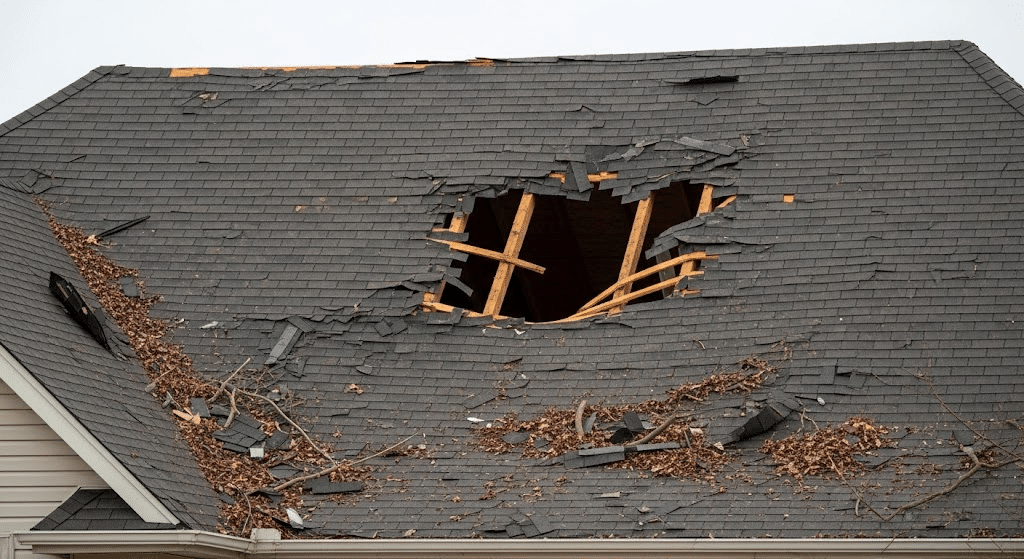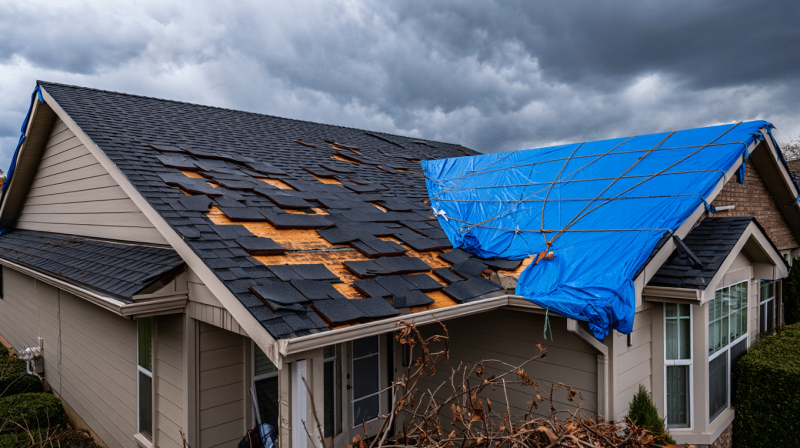I know that sinking feeling when you spot water dripping from your ceiling after a storm. Your mind races with questions, but one stands out: How long do I have to file a claim for roof damage?
Most homeowners don’t realize that waiting too long can cost them thousands in denied claims. I’ll walk you through the exact timelines you need to know.
This blog covers state-specific deadlines, insurance company requirements, and the steps that protect your coverage. You’ll learn how to act fast and file your claim the right way.
How Long Do I Have to File a Claim for Roof Damage?
Here’s the straight answer: you typically have 30 days to 1 year to file your roof damage claim.
But I’ve learned from years of helping homeowners: this timeline varies dramatically based on your insurance company and state laws.
I can’t stress this enough: check your policy the moment you spot damage.
Don’t wait until tomorrow or next week. Your specific deadline is buried in that policy document, and missing it could mean losing thousands in coverage.
Common Claim Filing Windows by Major Insurers:
| Insurance Company | Typical Filing Window | Notes |
|---|---|---|
| State Farm | 60 days | May extend for severe weather events |
| Allstate | 1 year | Standard policy terms |
| USAA | 1 year | Military-specific considerations |
| Farmers | 90 days | Varies by state regulations |
| Liberty Mutual | 60 days | Quick notification preferred |
| Progressive | 1 year | Property damage claims are allowed within the standard policy window |
I always tell homeowners to treat roof damage like an emergency. Call your insurance company within 24-48 hours of noticing the problem.
Even if you haven’t assessed the full extent yet, that initial call starts the clock and shows you’re acting responsibly.
Why Timing Matters More Than You Think?
I’ve seen too many homeowners learn this lesson the hard way.
Wait too long, and your insurance company can deny your claim entirely. They might slash your payout or reject it completely, leaving you with a massive repair bill.
Here’s what “reasonable time” really means to insurers: they expect you to report damage promptly after you reasonably should have noticed it. A small leak that turns into major water damage over months? They’ll argue you should have caught it sooner.
Your timing defense comes down to three things:
- Photos: Take them immediately when you find damage
- Repair estimates: Get these within days, not weeks
- Weather reports: Document the storm that caused the damage
The insurance company will question every delay. But solid documentation proves you acted as soon as you reasonably could. Don’t give them ammunition to use against you.
Claim Deadlines by Type of Roof Damage

Not all roof damage is treated equally by insurance companies. I’ve noticed they’re much stricter about certain types of damage than others.
1. Storm-Related Damage (Hail, Wind): These claims have the tightest deadlines. Most insurers want notification within 30-60 days because storm damage is obvious and immediate. You can’t miss a baseball-sized hail dent or missing shingles after a windstorm.
2. Gradual Wear or Leak Detection: This is where things get tricky. I’ve seen claims denied because homeowners couldn’t prove exactly when the damage started. Insurance companies love to argue that slow leaks are maintenance issues, not covered events.
3. Tree Fall or Structural Collapse: Call immediately – like, right now. These situations are emergencies that require instant notification. Most policies demand same-day or next-day reporting for structural damage.
3. Fire damage typically gives you more time since it’s clearly documented. Most insurers allow 60-90 days, but don’t test their patience.
4. Ice dam damage follows seasonal patterns. Report it during or right after winter weather events. Waiting until the spring melt can hurt your case.
Factors That Influence Claim Timeframes
From my experience, the timeline for insurance claims is shaped by a few key factors:
- State laws are huge: I’ve seen Texas put 30-day limits on homeowners, while California can give you up to 2 years. In Florida, the insurer has to acknowledge your claim within 14 days, but your actual filing deadline depends on your policy and company.
- Your policy type matters: Basic HO-1 policies often force you to report claims fast, but HO-3 or comprehensive coverage usually offers more flexibility. Special add-ons, like hurricane or earthquake riders, often come with their own unique timelines.
- Each company sets its own rules: USAA tends to be more lenient with military families, especially if deployed. State Farm often requires quicker reporting after storms, while Allstate may give you a longer window, though they ask for more paperwork upfront.
- Your history with the insurer counts: Long-term customers with clean records often get more slack if they’re late. New policyholders or people with prior claims usually face tighter enforcement and stricter deadlines.
When Should You Hire a Public Adjuster or Roofing Attorney?
I’ve watched too many homeowners get steamrolled by their insurance companies. Sometimes you need professional backup, and recognizing those moments can save you thousands.
Red flags that scream “get help now”:
- Your claim gets denied after what seems like obvious storm damage
- The adjuster’s estimate is half what local contractors quoted you
- They’re dragging their feet for months without explanation
- You’re getting buried in paperwork and confusing legal terms
- The insurance company stops returning your calls
The money math is simpler than you think. Public adjusters typically charge 10-15% of your final settlement. Roofing attorneys often work on contingency, meaning they only get paid if you win.
Wrapping Up
Don’t guess. Don’t wait. I’ve seen too many homeowners lose thousands because they thought they had “plenty of time” to file their roof damage claim.
When it comes to how long do I have to file a claim for roof damage, most claims must be filed within 30–365 days of the event.
Stop reading and go grab your insurance policy right now. Find that filing deadline. If you can’t locate it or don’t understand the language, call your insurer today. A five-minute phone call could save you from financial disaster tomorrow.
Your roof protects your home. Make sure your coverage protects your wallet.








